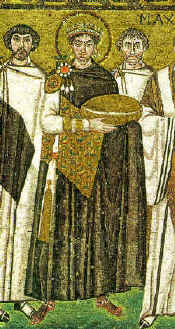Justin ian established
a ten-man commission chaired by John the Cappadocian to produce a
new code of law. The commission produced the
Codex Justinianus (Codex vetus) on 7 April, 529.
Then Justinian ordered
the codification of the legal opinions of the
Roman jurists from ca. first century B.C. to the third
century A.D. On 15 December 530 he ordered a
commission to work at it: sixteen lawyers from the legal fraternities of
Constantinople and Beirut, men headed by Tribonian, who
had already been a member of the commission that
produced the Codex Justinianus. The result of their labor was published on 16
December, 533 and was called the Digest, or to give it its
Greek name, the Pandects. At the same time, a committee also headed by Tribonian
was working on a textbook for law students,
the
Institutes
that was based in large part on an earlier work of the
jurist Gaius. It was published on 16
November. One byproduct of all this labor was to make
the Codex vetus obsolete, and hence a new edition was published on 16 November,
534 and the first edition has failed to survive. This body of legal
achievement has been known since the sixteenth century as the
Corpus iuris civilis and it was intended as a unified body of law. Justinian forbade
commentaries on the Digest and probably the rule applied to the whole
Corpus.
The last part of Justinian's
codification was the
Novels (Novellae) They were new
laws that he issued after the Corpus was published.
The language of these constitutions was Greek.
He may have planned a collection
of his own legislation, but they were only put together as a collection until
after his death. ian established
a ten-man commission chaired by John the Cappadocian to produce a
new code of law. The commission produced the
Codex Justinianus (Codex vetus) on 7 April, 529.
Then Justinian ordered
the codification of the legal opinions of the
Roman jurists from ca. first century B.C. to the third
century A.D. On 15 December 530 he ordered a
commission to work at it: sixteen lawyers from the legal fraternities of
Constantinople and Beirut, men headed by Tribonian, who
had already been a member of the commission that
produced the Codex Justinianus. The result of their labor was published on 16
December, 533 and was called the Digest, or to give it its
Greek name, the Pandects. At the same time, a committee also headed by Tribonian
was working on a textbook for law students,
the
Institutes
that was based in large part on an earlier work of the
jurist Gaius. It was published on 16
November. One byproduct of all this labor was to make
the Codex vetus obsolete, and hence a new edition was published on 16 November,
534 and the first edition has failed to survive. This body of legal
achievement has been known since the sixteenth century as the
Corpus iuris civilis and it was intended as a unified body of law. Justinian forbade
commentaries on the Digest and probably the rule applied to the whole
Corpus.
The last part of Justinian's
codification was the
Novels (Novellae) They were new
laws that he issued after the Corpus was published.
The language of these constitutions was Greek.
He may have planned a collection
of his own legislation, but they were only put together as a collection until
after his death.
Mosaic of
Justinian in San Vitale, Ravenna |